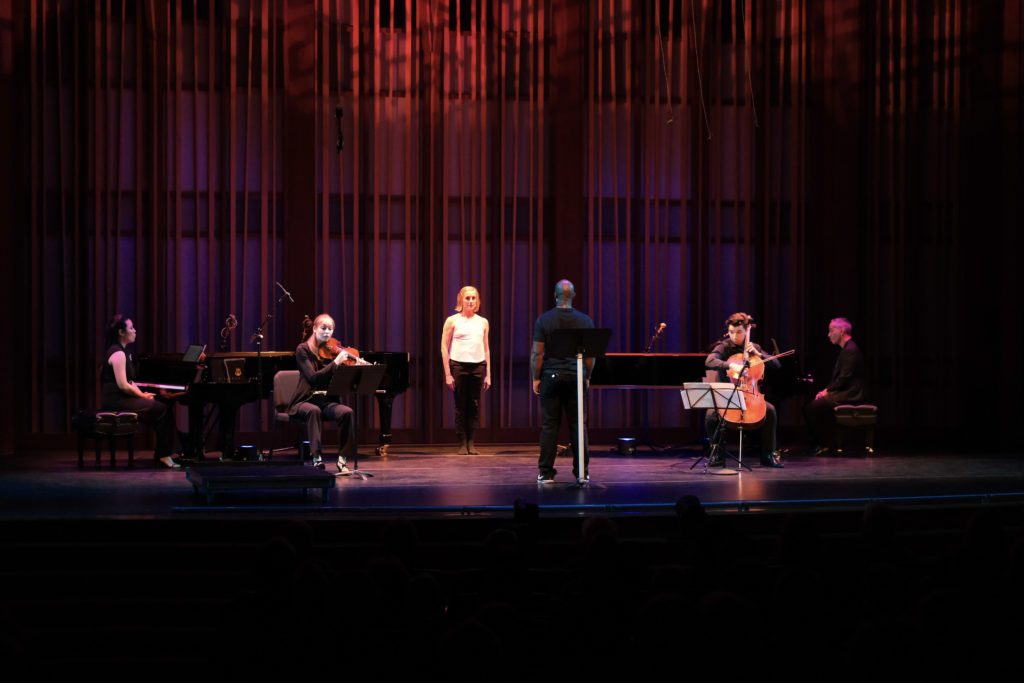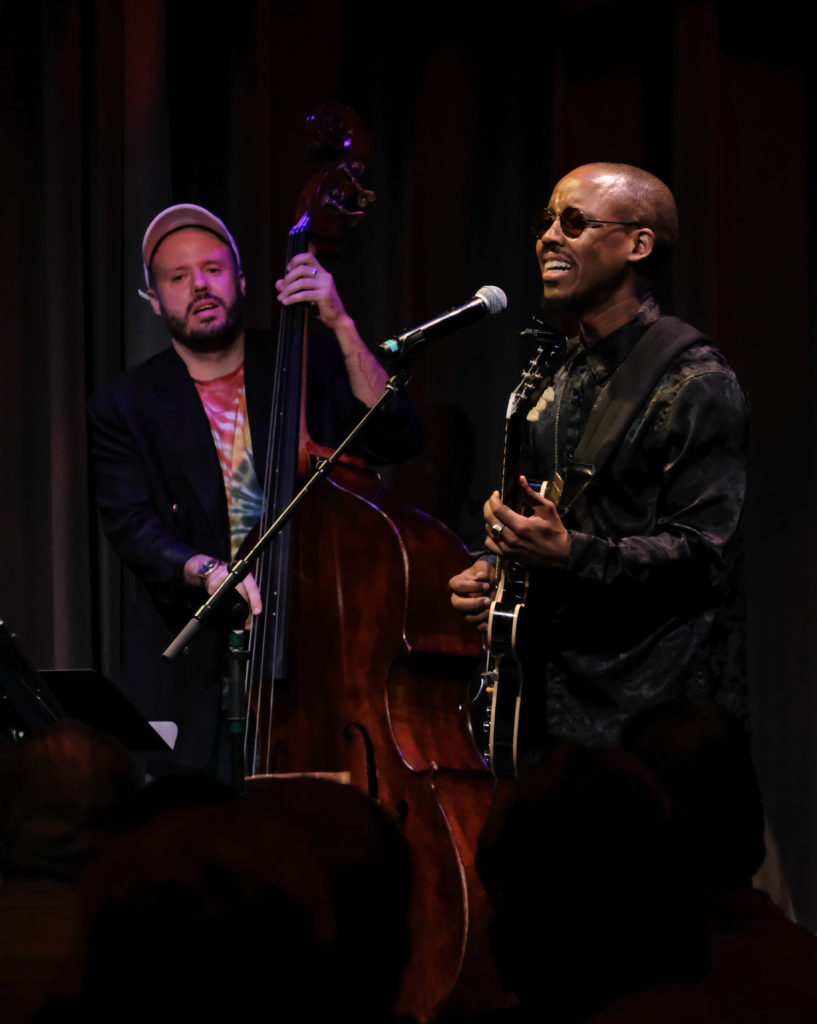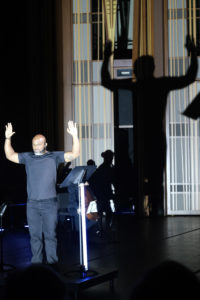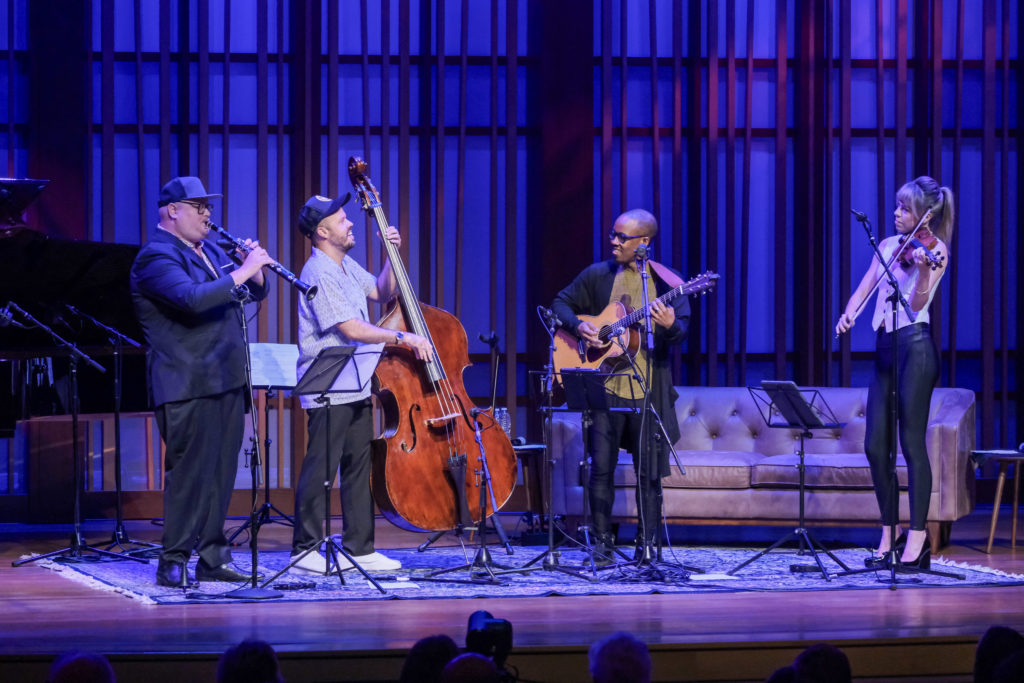SummerFest’s Synergy Series Follows the Musical Road Not Taken
The Louis Cato Trio opened SummerFest’s Synergy Series Thursday with an urbane, gratifying jazz concert in the JAI. You don’t have to be a seasoned jazz aficionado to recognize Cato, who has played guitar in the band of television’s Late Show with Stephen Colbert for nearly a decade and was recently named bandleader of The Late Show Band.
With his equally sophisticated colleagues bassist Michael Thurber and percussionist Otis Brown III, Cato served up insightful jazz interpretations of a wide range of American music: from romantic hits by Harold Arlen and Jerome Kern plucked from the Great American Songbook to the civil rights gospel anthem “Keep on Pushin’.”The trio covered Miles Davis’ “Milestones,” Bill Withers’ “Lovely Day,” Chuck Wicks’ “Starting Now,” and Steve Winwood’s “Can’t Find My Way Home.” And they gave consolation to disappointed lovers with R & B singer R. Kelly’s “Back and Forth” and Twin Shadow’s more recent “Old Love.”
As the trio’s understated vocalist, Cato brought surprising power to Winwood’s folk rock ballad, yet his laid-back insouciance deftly deconstructed Kern’s “All the Things You Are.” But there was never a scintilla of doubt about his deep conviction for every song he sang. Thurber’s athletic bass improvisations and Brown’s inspired percussion riffs complemented Cato’s approach at every turn.
I’m willing to wager that not many individuals listening to Camille Saint-Saëns’ instrumental suite Carnival of the Animals would connect its amusing depictions of the animal kingdom to the January 6, 2021, insurrection in Washington D.C. But on Friday‘s Synergy adventure at The Conrad, accomplished writer and actor Marc Bamuthi Joseph used Saint-Saëns’ suite as the blueprint from which to construct a mock-heroic poem that narrated and commented on that unprecedented violent attempt to reverse a national election.
To turn this perceptive and unabashedly political poetry into an hour-long work of performance art for SummerFest–a special preview performance for the premiere in Seattle, WA, in April 2024–Joseph enlisted dancer Wendy Whelan and choreographer Francesca Harper to physically interpret the text on stage. He was assisted by four SummerFest musicians to play ten musical interludes that alternated with sections of the poem like a towering club sandwich. Pianists Joyce Yang and Inon Barnatan played from matching concert grands, ably assisted by violinist Geneva Lewis and cellist Gabriel Martins.

(l. to r.) Joyce Yang, Geneva Lewis, Wendy Whelan, Mark Bamuthi Joseph, Gabriel Martins & Inon Barnatan [photo (c.) Ken Jacques
Given the size and scope of a mob attack on the Capitol, assigning a single dancer to interpret this event on a stage already compromised by the presence of pianos, musicians, and the speaker’s podium is a daunting challenge to say the least, so kudos to Wendy Whelan for realizing Harper’s succinct choreography with such graceful conviction. The dramatic and varied lighting design of John E. D. Bass helped unify the production’s components.
If you had a spacious, comfortable living room and invited Louis Cato, Mark Dover, Tessa Lark and Michael Thurber over to spend the evening with your friends and neighbors, these four musicians might have improvised the sort of relaxed jam session they played at the Baker-Baum Concert Hall Saturday evening, the final program of SummerFest’s Synergy Series.
A baker’s dozen of pieces from popular and traditional sources announced from the stage served as the launching pad for unusually bravura solo and ensemble interpretation. The group started their program with James F. Hanley’s tin pan alley hit “Back Home in Indiana,” giving Mark Dover the opportunity to explore at length the extreme upper range of his clarinet. An abstract, cadenza-like instrumental prelude suddenly turned into George Gershwin’s “Summertime,” expounded in a slow swagger that ended with yet another cadenza. Tessa Lark livened the room with her acrobatic dash through “Boy in the Gap,” a traditional Irish fiddle tune recently popularized by the Martin Hays Quartet, as well as her soaring descant in Jimmy Webb’s “Wichita Lineman,” the country song Glen Campbell made a hit in 1968. Louis Cato shared his own confessional song “Unsightly Room,” and Paul McCartney’s iconic “Blackbird” benefited from a virtuoso solo introduction to the ensemble’s heartfelt performance.
There were a few classical moments on the program: Inon Barnatan joined the ensemble to tear into some of Gershwin’s own bold piano variations on his song “I Got Rhythm,” and Tessa Lark offered an impressive solo account of the “Finale” from Eugéne Ysaÿe’s Sonata No. 4. Lark and Thurber gave their agile take on the J.S. Bach Two-Part Invention in C Major, followed by their own update of the piece.The La Jolla Music Society presented these three concerts at La Jolla’s Conrad Prebys Performing Arts Center August 17 to 19, 2023. The SummerFest 2023 runs through August 26, 2023, in the same venue.

Ken Herman, a classically trained pianist and organist, has covered music for the San Diego Union, the Los Angeles Times’ San Diego Edition, and for sandiego.com. He has won numerous awards, including first place for Live Performance and Opera Reviews in the 2017, the 2018, and the 2019 Excellence in Journalism Awards competition held by the San Diego Press Club. A Chicago native, he came to San Diego to pursue a graduate degree and stayed.Read more…



